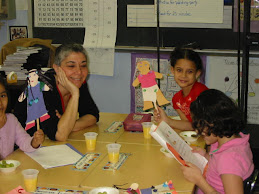 |
| Il Giardino dei Cedri Internt'l School, Rome |
I mailed them about two in the afternoon, 8 p.m. their time. Sprang out of bed too early this morning, spurred by the hope that my box would be full of electronic braccia aperte...nothing yet.
Helen Keller advised, "Life is a daring adventure, or nothing at all." But I've lived more of the life Thoreau warned about, one of quiet...well, not desperation, but comfy stability. Married at 21, lived in the same city all my life, chose the professional safety of teaching which, though really kind of a cubicled skydive, is at least an approved form of free fall for women. So the sabbatical, and my month in Rome, are my once-in-a-lifetime walk on the wild side.
Not that there's any real peril involved. My school is required to keep a position open for me; my reduced salary will suffice now that the kids are done with college; my husband will probably join me for a week or two, and Rome is pretty bite-sized. Many of my teacher friends seem envious, wonder aloud, "Why haven't I done that?" This is mostly wistful rhetoric, though, delivered with bemused smiles and teasing allusions to Eat, Pray, Love (I respond that, since I will not go on to India or Indonesia, my travelogue will be titled Eat, Eat, Eat.) Though one friend shook her head in both concern and admiration, murmuring, "That's a pretty big risk you're taking, there." Cool.
Why did I choose Rome? Despite the allegations of Liz Gilbert wannabe-ism, my crush on the Eternal City predates her premeditated and heavily advanced call to impetuous adventure by decades. Even before my husband and I took our first trip about six years ago, the allure of Italy's history, romance, sensuality, food and pace was magnetic -- how could I not love a people who coined my life's philosophy, "Dolce far niente" or "How sweet to do nothing"? The language itself, one of the few world's tongues actually chosen by its people over other dialects because of its aesthetic appeal, was a huge turn-on in my second-language-themed journey. Our trip -- walking daily and casually through ancient ruins and cobblestoned markets, stopping for leisurely outdoor lunches with vino alongside warm Roman office workers doing likewise, absorbing the music and poetry of their conversation in a way I understood although I could not translate -- just made me fall that much deeper and harder. I could have chosen stunning Florence this time, and I will stay a night or two, but I want to live in the city I visit, not as a tourist. Rome is familiar enough now that I can forgo the Colosseum tour and the Trevi coin-toss and meet a friend for a movie and make dinner for us both afterwards.
 |
| The flat on Trastevere's Via Garibaldi |
 |
| The Almost Corner Bookstore |
I'll keep you posted about those collegial open arms in my inbox!









